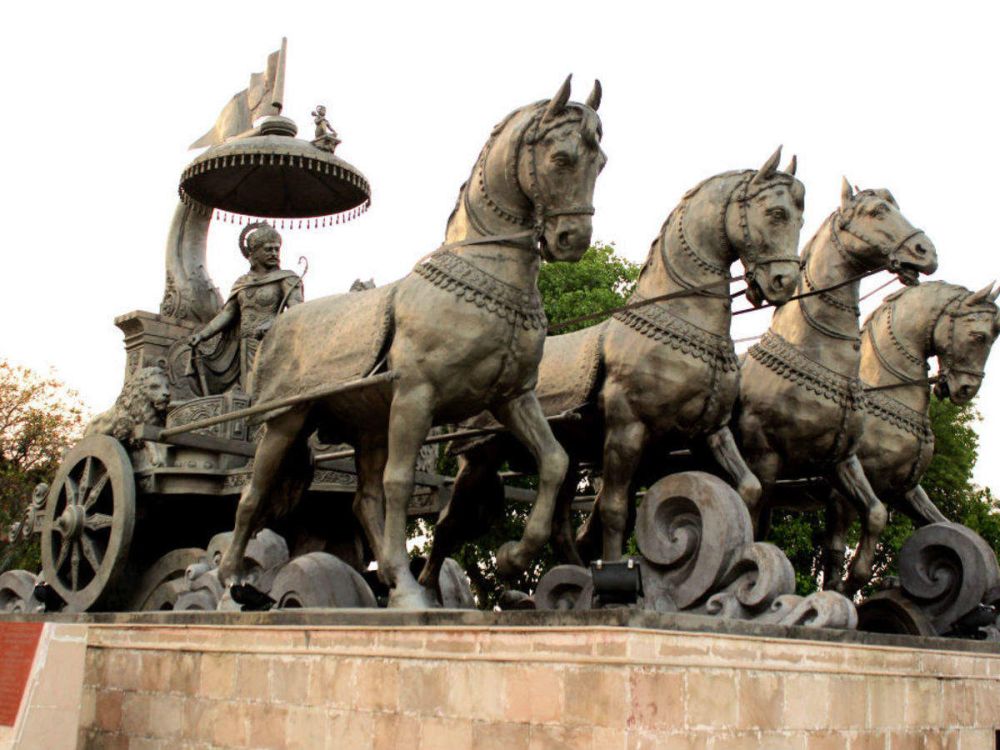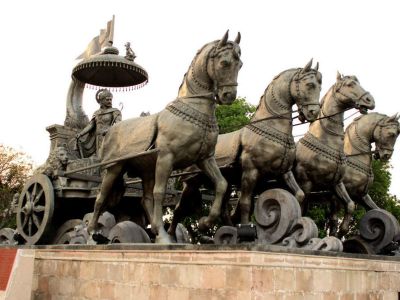

The Kurukshetra Panorama and Science Centre is a unique destination that combines historical significance with scientific exploration. As visitors enter the center, they are greeted by a stunning panorama of the Mahabharata battle, depicting the epic war of Kurukshetra. The intricate artwork and lifelike figures give a sense of the grand scale of this ancient conflict. Beyond the panorama, the science center offers a host of exhibits on various scientific themes. Interactive and engaging, the center is designed to spark curiosity and encourage learning in visitors of all ages. From the evolution of man to the marvels of space exploration, each exhibit is crafted to educate and inspire. The center also features a sky-gazing session in the evenings that allows visitors to observe the stars and planets through telescopes, weather permitting. Visiting this establishment offers a blend of cultural and educational experiences, sure to enrich any traveler's visit to Kurukshetra.
The Krishna Museum in Kurukshetra is dedicated to Lord Krishna, a central figure in Hindu mythology and the epic Mahabharata. This museum houses a rare collection of artifacts and sculptures that portray the various aspects and incarnations of Lord Krishna. As visitors walk through the galleries, they can witness the influence of Krishna's teachings across different regions and times through the art on display. The museum showcases ancient sculptures, paintings, and manuscripts that depict scenes from the life of Krishna, such as his childhood pastimes, his role in the epic Battle of Kurukshetra, and his philosophical discourses. The Krishna Museum is an essential stop for anyone interested in Indian art, culture, and spirituality. With artifacts dating back centuries, it provides deep insights into the religious and historical significance of the region.
Gita Jayanti is an annual festival celebrated in Kurukshetra to commemorate the day when Lord Krishna delivered the Bhagavad Gita to Arjuna on the battlefield of Kurukshetra. The festival is a vibrant, spiritual event that attracts devotees and tourists from all over the world. Visitors can immerse themselves in the religious fervor, with chants of the Gita echoing throughout the city. The event includes a series of rituals, prayers, and cultural programs. Various stalls showcase religious books, crafts, and vegetarian delicacies. One of the highlights of Gita Jayanti is the 'Gita Mahotsav,' a grand fair that includes recitations, dance, drama, and musical performances based on themes from the Mahabharata. This festival not only celebrates the essence of the holy scripture but also offers a glimpse into the local customs and traditions of Haryana.
Brahma Sarovar is an ancient water tank in Kurukshetra that holds immense religious significance. It is believed that a dip in this holy sarovar can absolve one of sins and grant salvation. The vast expanse of water provides a serene and tranquil atmosphere, making it an ideal spot for meditation and reflection. Visitors can enjoy a leisurely walk around the perimeter of the sarovar, which is beautifully landscaped and dotted with temples and shrines. During solar eclipses, the sarovar attracts pilgrims in large numbers, who come to bathe in its sacred waters. The evening Aarti is particularly enchanting, as countless diyas (lamps) are floated on the water, creating a mesmerizing sight. The nearby complex also has facilities for cultural performances, exhibitions, and meditation sessions, offering a holistic spiritual experience.
Sannihit Sarovar is another significant water body in Kurukshetra that traces its origins back to ancient times. Considered one of the holiest sites in Hinduism, the sarovar is believed to be the confluence of seven sacred Sarasvati rivers. The tranquil ambiance of the sarovar, coupled with the presence of numerous temples and sacred shrines along its banks, makes it a popular pilgrimage destination. Legend has it that a dip in the Sarovar, especially on the days of Amavasya (new moon), can bring the blessings equivalent to performing several Ashvamedha Yajnas. The area comes alive during the festivals like Somvati Amavasya and solar eclipses, when thousands of devotees gather to take a sacred bath. Visitors can explore the temples, enjoy the peaceful environment, and occasionally, witness religious ceremonies and rituals that are regularly performed by the ghats.
Jyotisar is a revered site in Kurukshetra, distinguished as the place where Lord Krishna is said to have delivered the eternal message of the Bhagavad Gita to Arjuna before the commencement of the great battle. The site is marked by an ancient Banyan tree, under which the sacred conversation is believed to have taken place. A beautiful marble chariot depicting Krishna and Arjuna stands as a testimony to this historic event. The surroundings of Jyotisar are serene and filled with vibrant spiritual energy. Visitors can take a guided tour to learn more about the significance of the Bhagavad Gita, the teachings of Lord Krishna, and the history of the Mahabharata. An awe-inspiring sound and light show held in the evenings narrates the events leading up to the great war, making a visit to Jyotisar an enlightening and memorable experience.
Raja Harsh ka Tila is an archaeological site that provides insights into the region's rich history, spanning the Gupta period to the Mughal era. The site consists of layers of historical importance, with remains from ancient settlements, temples, and fortifications. Visitors interested in archaeology and history will find this place captivating as it reveals artifacts, terracotta figurines, pottery, coins, and structures that showcase the lifestyle of past civilizations. The remains of an ancient Buddhist Stupa and monastery unearthed here highlight the influence of Buddhism in the region. The site also provides evidence of Harsha's kingdom, which once flourished in Kurukshetra. Guided tours can help interpret the findings and excavations, offering a walk through the corridors of time. Raja Harsh ka Tila is a window into the past, offering a rare opportunity to touch the layers of time buried beneath the present terrain.
Sheikh Chehli ka Maqbara, also known as the Tomb of Sheikh Chehli, is an architectural wonder representative of Mughal design. This 17th-century tomb is believed to be the burial site of the Sufi saint Sheikh Chehli, who was the spiritual teacher of the Mughal prince, Dara Shikoh. The structure is renowned for its elaborate carvings, magnificent dome, and the intricate inlay work that adorns its walls. The mausoleum is set within a beautifully maintained Charbagh-style garden with pathways, fountains, and intricate geometric designs typical of Mughal gardens. Visitors to the maqbara can marvel at the craftsmanship and the aura of peace that surrounds this monument. It is an essential visit for those interested in the architectural heritage and Sufi history of India. The tranquility and beauty of the site offer a quiet retreat from the bustling streets outside.
Pipli Zoo, located on the outskirts of Kurukshetra, serves as a delightful getaway for families and wildlife enthusiasts. Spanning several acres, the zoo is home to a variety of animal species, both indigenous and exotic. Visitors can observe the behaviors and habitats of different animals, including deer, monkeys, birds, and reptiles. The zoo provides an educational experience, where kids and adults alike can learn about conservation efforts and the importance of protecting wildlife. Alongside animal sightings, the zoo offers lush green spaces perfect for picnicking and relaxing. Children can enjoy the dedicated play areas, while adults can stroll along the paths and soak in the natural ambiance. Pipli Zoo combines the pleasure of recreational activities with the chance to connect with nature, making it an endearing attraction for a leisurely day out.
The Kurukshetra Festival is an annual celebration that marks the importance of the land of Kurukshetra in Indian mythology and history. It is typically held in December and brings to life the epic saga of the Mahabharata. This multi-day festival features a range of cultural programs, including dance, music, drama, and enactments of scenes from the Mahabharata, drawing performers and artists from various parts of the country. The festival also includes seminars, exhibitions, and book fairs, focusing on the significance of the epic and its relevance to contemporary times. Visitors can take part in the festivities, enjoy the performances, and indulge in local cuisine served at food stalls. The festival's vibrant atmosphere, combined with its historical and educational elements, provides a comprehensive cultural experience that honors the legacy of this ancient land.
